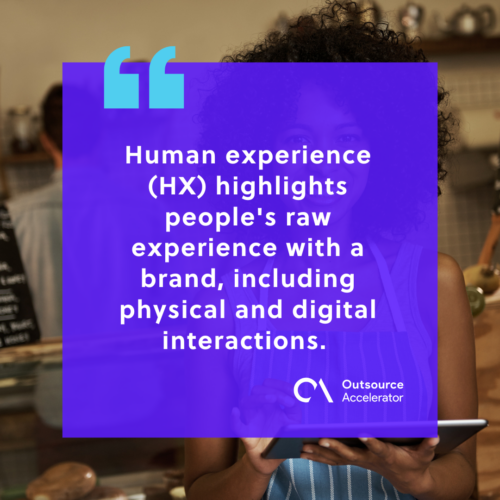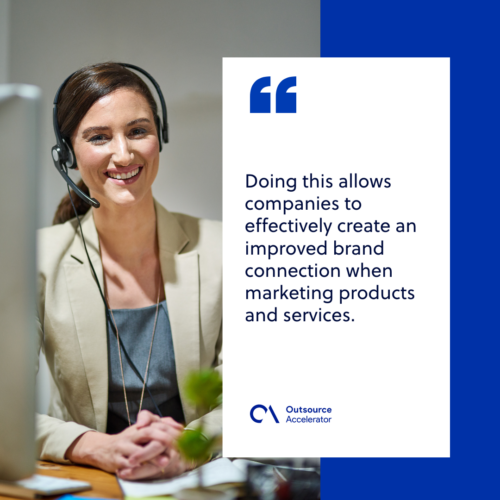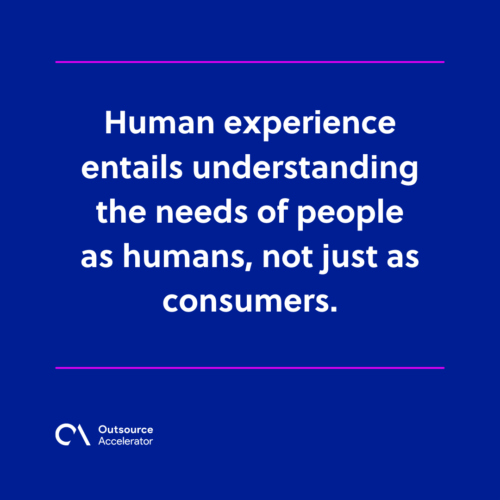Human experience: Making a value-driven business

In the modern age, technology is constantly present.
We shop for food and furniture online, catch up with each other on social media, and use numerous other digital services daily.
Due to this, we may often forget how human beings move in the world naturally.
In marketing, for instance, customer engagement and attraction are mostly digital. Clients receive ads and content online.
This is why the concept of human experience is important in businesses.
Human experience intends to approach companies and consumers without neglecting the human essence, an aspect that is often lost in digital interaction.
This concept is even more relevant now, in our post-pandemic world where remote work is constantly rising, and technology only improves.
Explore the concept of human experience, the role that emotion plays in it, and the best practices for applying it in your own business.
What is human experience in business?
Human experience (HX) highlights people’s raw experience with a brand, including physical and digital interactions. “People,” in this context, involves customers and employees.
The scope of human experience is vast and complicated. It involves psychology, sociology, and the intersection of work and personal life.
Receiving the best possible experiences allows workers and consumers to contribute consistently, positively, and meaningfully to a business and their community.

Human beings are inherently social. They require connection with fellow humans to thrive and crave a sense of community.
Eye contact, facial expressions, and shared experience can only be achieved through physical interaction.
Nowadays, technology is advancing further and is being utilized in many areas previously dominated by humans. Interaction between people is decreasing due to automation and AI tools.
This may lead to anxiety in human workers and the isolation of consumers.
To acknowledge and appreciate human beings, HX puts them at the center of a company’s marketing techniques. This is also an effort to create valuable connections.
Human experience vs. customer experience vs. user experience
Having heard of customer experience, user experience, and now human experience, you may find yourself confused, and understandably so.
These three concepts all have something to do with the experience that brands provide to humans. But they differ in significant aspects, as you will see below.
- Customer experience (CX) is the overall interaction between a company and its consumers.
An organization enhances this by implementing marketing and relationship strategies that they deem successful. The goal is to create a valuable consumer experience during their interactions with the brand.
- Meanwhile, user experience (UX) is how consumers interact with digital products and interfaces. Companies optimize their UX by tasking qualified employees to design user-friendly and eye-pleasing apps and websites.
- Human experience (HX) is a concept that proposes for companies to be human-centric. This entails implementing strategies on human beings as they are: Living entities with the capability for emotion.
One of the main differences between human experience and customer experience is simply the perspective.
In CX, people who consume a brand’s products and services are called customers or shoppers. They are seen as a source of income. “Needs” and “pain points” are words thrown around in finding the best way to sell offers, disregarding true empathy.
In HX, this is not the case. Customers and employees are viewed as humans and treated like so. The human experience aims to create genuine and valuable connections with people without the underlying goal of making a profit.
The role of emotion in human experience
The human experience is induced by emotion. It is the biggest driver of loyalty, both for customers and employees.
How people feel about a brand due to their strategies significantly contributes to that company’s human experience.
It’s also important to note that most decisions are based on emotional reactions. Humans use fast, intuitive thinking instead of lengthy, logical thinking when making decisions.
Thus, businesses can better relate to their customers and employees by understanding the human experience and its various emotions.
Doing this allows companies to effectively create an improved brand connection when marketing products and services.
But then, a question arises: How can your company measure its success in emotionally satisfying customers and employees?
The answer is simple: Listen.
You can do this with the help of technological assistance – some digital way of making emotions into digestible data. An example of this is sentiment analysis.
Sentiment analysis processes unstructured data with speed and at scale. This data may include customer reviews, voice data, and social media content.
Some other technologies can give you an overview of people’s thoughts and feelings about your brand and offerings. These can also track this data over time, enabling you to identify any trends and improvements.

Best practices for applying human experience in your company
Now you know more about the human experience and its relation with emotions. You may have already gauged whether implementing it is the right fit for your company.
If you are interested in applying human experience in your business, check out the list of best practices for it below:
Embody your brand values and purpose
Your company’s values and purpose should be explicitly defined during brand strategy planning. In addition, all subsequent decisions and actions should align with these.
The purpose and values need to be ingrained into you and your employees’ minds. They shouldn’t just be regarded as a one-time, insignificant work factor. If they are, then your company’s strategies may not match what you want to communicate.
Ensure that you embody these values and that your team follows your lead on them. Incorporate your brand’s essence into every one of your employees’ routines.
Be accepting of mistakes
Humans are not machines; they make mistakes and cannot be programmed to work flawlessly.
This fact is widely acknowledged, and yet, nothing but perfection is expected out of employees.
No one wants to make mistakes or be subjected to them. Workers who overlook a flaw in their output are more disappointed in themselves than their superiors are.
It’s important to accept mistakes and the fact that they will inevitably occur when working with humans.
To elevate the human experience, create a culture within your company that is not only tolerable of mistakes but accepting of them.
Exercise this while still celebrating achievements, and your employees will follow your example.
By doing this, you are effectively producing a more humanized working environment for your employees.
Understand human needs
Marketing teams already do research to identify consumer needs. But these studies don’t embrace the entirety of human complexity. They merely determine what offers can help people and therefore generate revenue.
Human experience entails understanding the needs of people as humans, not just as consumers. To communicate with your customers and employees, you must understand the deepest of their needs.

Exercise empathy
People feel different emotions throughout their day and week. Most of the time, consumption is only an insignificant part of a customer’s day.
By keeping this in mind, you and your employees can match your strategies to your client’s current mood and empathize with them.
For instance, let’s say you offer veterinary services. If a client calls for an emergency, then they are most likely feeling worried about the state of their pet.
The right choice would be to take the matter seriously while reassuring the customer and prioritizing finding a solution. Most importantly, do not use the situation as an opportunity to sell your products.
Create caring and inclusive spaces
You and your employees must create relationships by showing that your brand cares about people.
While discounts are appreciated, sometimes people just need to feel welcomed or have a sense of belonging. With the right strategies, you can provide these to your customers.
On top of that, you should continuously practice inclusivity and celebrate diversity.
You may have employees and clients who are blind, deaf, mute, or otherwise physically disabled. A few of them may be mentally challenged, and there are some who are in a same-sex relationship, or who are single parents.
While these human traits may not be directly related to your offers, it’s important to be constantly aware of them.
Your company should also make a point to keep these conditions in mind when planning for new offerings, social media campaigns, training curricula, and building architecture.
Why you should optimize the human experience for your business
The rise of human experience is a good opportunity for you to reevaluate your offers, content, and marketing strategies.
How are they improving people’s lives? How can they provide an experience that is valuable both practically and emotionally?
Companies that provide humanized experiences for customers and employees tend to grow faster and build stronger loyalty to their brand.
If businesses can improve the lives of consumers and employees, they will establish deeper, more valuable connections.
Further, understanding and improving the human experience is a vital competitive advantage in a frequently unpredictable global economy.







 Independent
Independent




